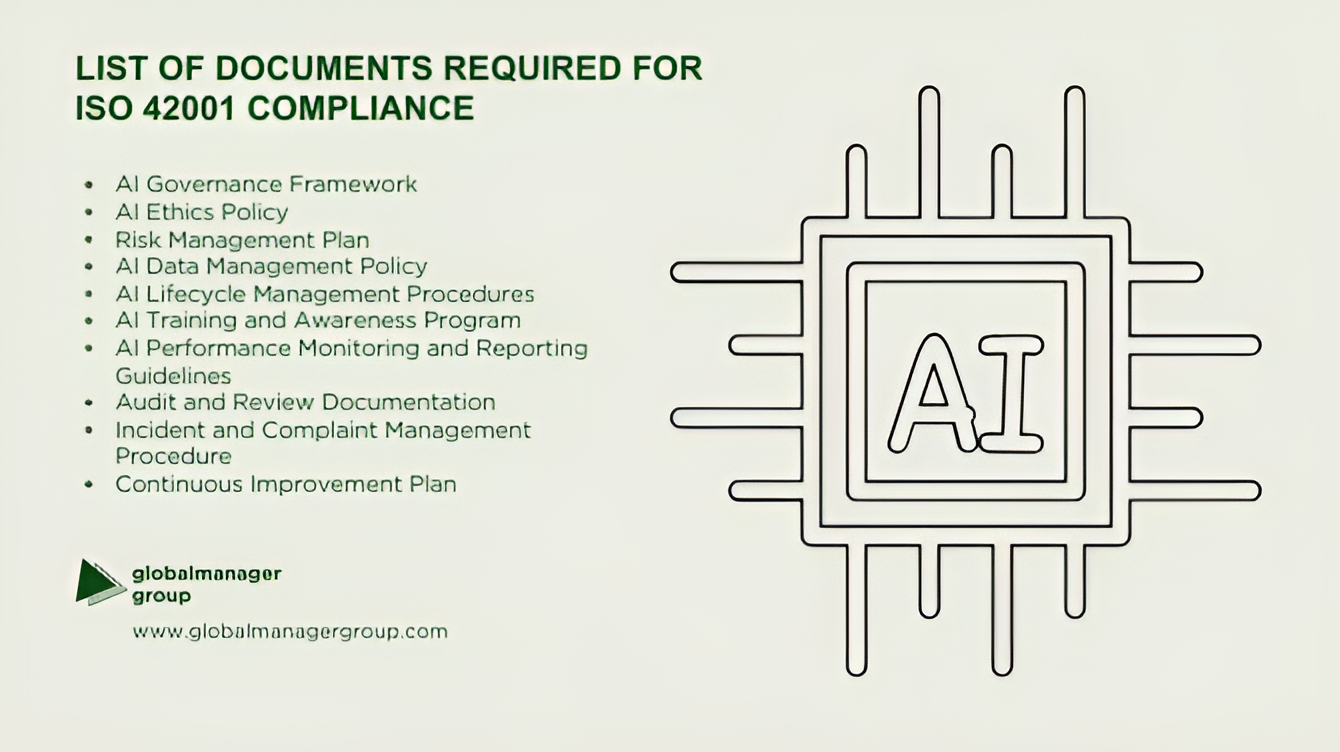
ISO 42001 sets guidelines for creating an AI Management System (AIMS), ensuring the ethical and responsible use of AI within organizations. Compliance with this standard shows a commitment to managing AI in line with legal, ethical, and safety standards. To achieve certification, businesses must prepare and maintain several key documents, listed below.
1. AI Governance Framework
A governance framework outlines how AI is managed across the organization. This includes how AI projects are initiated, monitored, and evaluated. The document should clearly describe the roles and responsibilities of team members in the AI lifecycle and the strategies to ensure AI technologies align with organizational goals.
2. AI Ethics Policy
This policy ensures that AI systems are developed and used in an ethical manner. It covers key ethical considerations, such as fairness, transparency, accountability, and privacy. The document should provide guidelines on mitigating bias, avoiding discrimination, and maintaining user trust.
3. Risk Management Plan
The risk management plan identifies potential risks associated with AI systems and outlines how to address these risks. It includes risk assessment methods, risk mitigation strategies, and contingency plans. This document should also define the process for regular risk reviews to ensure that AI systems continue to be safe and compliant over time.
4. AI Data Management Policy
Data is a critical component of AI, and how it's managed is vital for ISO 42001 compliance. The AI Data Management Policy should specify how data is collected, stored, processed, and protected throughout the AI lifecycle. It should also include data privacy and security measures to safeguard sensitive information and comply with data protection laws.
5. AI Lifecycle Management Procedures
This document covers the full lifecycle of AI systems, from planning and development to deployment and maintenance. It ensures that AI technologies are developed in a structured, consistent manner, and that each stage of the AI lifecycle adheres to organizational standards and ISO 42001 requirements.
6. AI Training and Awareness Program
An essential document for ensuring all staff involved in AI development are properly trained. This program should include guidelines for training personnel on AI ethics, governance, risk management, and compliance with ISO 42001. Regular updates and refresher courses may be necessary to stay up-to-date with evolving technologies and standards.
7. AI Performance Monitoring and Reporting Guidelines
Once an AI system is deployed, it must be regularly monitored for performance, effectiveness, and compliance. This document should outline the monitoring methods, key performance indicators (KPIs), and reporting procedures. It ensures that any deviations from expected performance or compliance issues are identified and corrected promptly.
8. Audit and Review Documentation
Regular audits are a core requirement for ISO 42001 compliance. This documentation provides detailed procedures for auditing AI systems and practices to ensure they comply with the established standards and regulations. The audit process should be well-documented, with clear roles, responsibilities, and schedules for periodic reviews.
9. Incident and Complaint Management Procedure
In case of any issues or complaints regarding the AI system, there must be a clear procedure for handling them. This document should outline how incidents, concerns, or complaints about AI technologies are reported, investigated, and resolved, ensuring transparency and accountability in the process.
10. Continuous Improvement Plan
ISO 42001 requires organizations to continuously improve their AI Management System. The Continuous Improvement Plan documents how improvements will be identified, implemented, and tracked over time. It encourages a culture of ongoing development and refinement to enhance AI systems and maintain compliance with the standard.
Achieving ISO 42001 compliance requires careful planning and documentation. The ISO 42001 documents listed above form the foundation of a robust AI Management System that promotes ethical AI use, reduces risks, and ensures that AI systems contribute positively to society. By maintaining these key ISO 42001 documents organizations can demonstrate their commitment to AI governance, compliance, and continuous improvement.


































